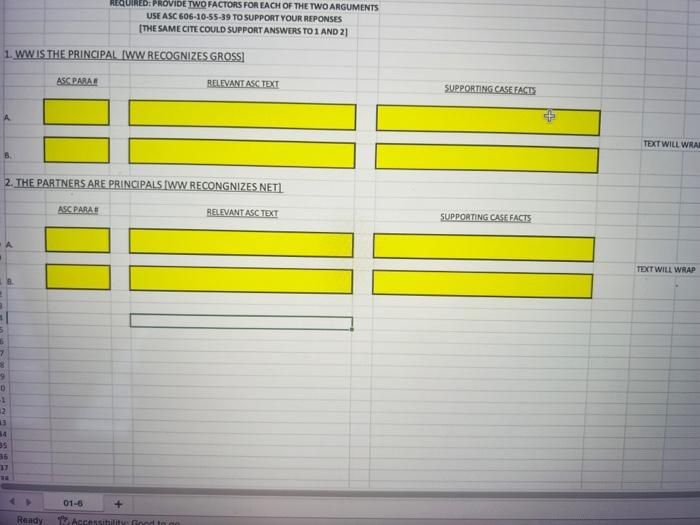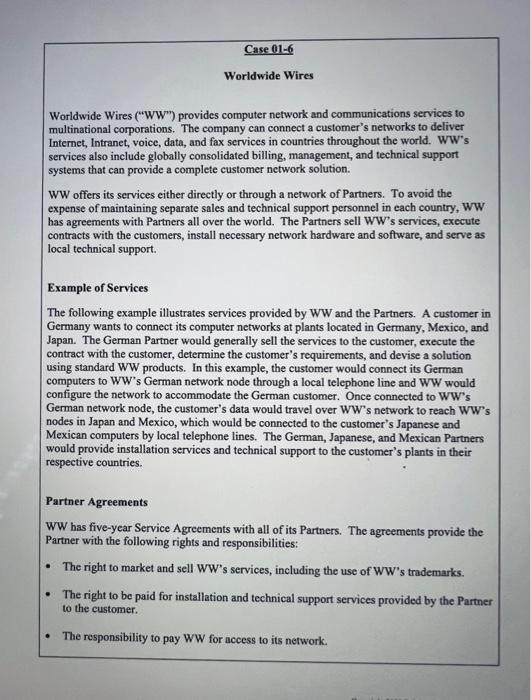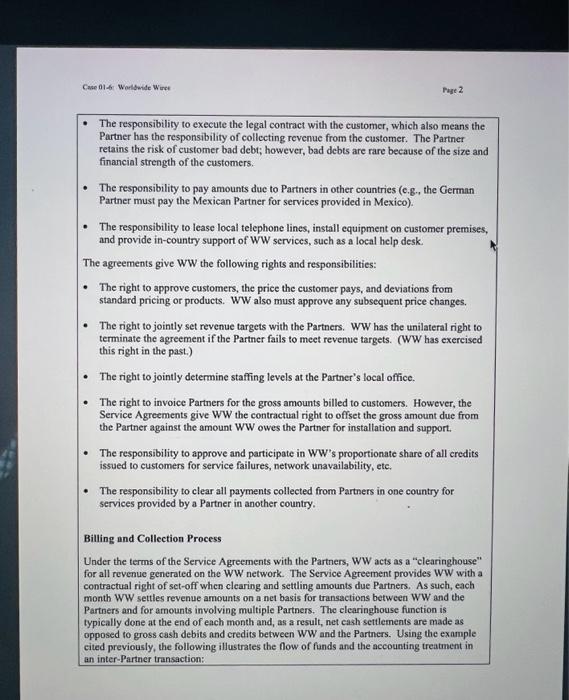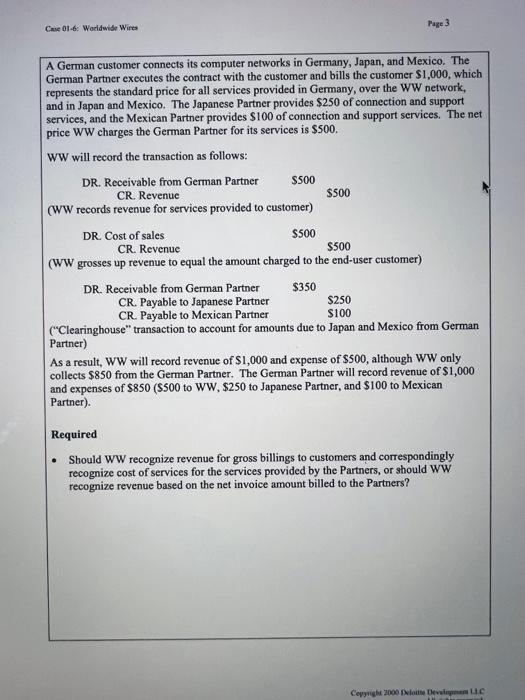
Please answer the two questions on the excel sheets based on the case above
Worldwide Wires ("WW") provides computer network and communications services to multinational corporations. The company can connect a customer's networks to deliver Internet, Intranet, voice, data, and fax services in countries throughout the world. WW's services also include globally consolidated billing, management, and technical support systems that can provide a complete customer network solution. WW offers its services either directly or through a network of Partners. To avoid the expense of maintaining separate sales and technical support personnel in each country, WW has agreements with Partners all over the world. The Partners sell WW's services, execute contracts with the customers, install necessary network hardware and software, and serve as local technical support. Example of Services The following example illustrates services provided by WW and the Partners. A customer in Germany wants to connect its computer networks at plants located in Germany, Mexico, and Japan. The German Partner would generally sell the services to the customer, execute the contract with the customer, determine the customer's requirements, and devise a solution using standard WW products. In this example, the customer would connect its German computers to WW's German network node through a local telephone line and WW would configure the network to accommodate the German customer. Once connected to WW's German network node, the customer's data would travel over WW's network to reach WW's nodes in Japan and Mexico, which would be connected to the customer's Japanese and Mexican computers by local telephone lines. The German, Japanese, and Mexican Partners would provide installation services and technical support to the customer's plants in their respective countries. Partner Agreements WW has five-year Service Agreements with all of its Partners. The agreements provide the Partner with the following rights and responsibilities: - The right to market and sell WW's services, including the use of WW's trademarks. - The right to be paid for installation and technical support services provided by the Partner to the customer. - The responsibility to pay WW for access to its network. - The responsibility to execute the legal contract with the customer, which also means the Partner has the responsibility of collecting revenue from the customer. The Partner retains the risk of customer bad debt; however, bad debts are rare because of the size and financial strength of the customers. - The responsibility to pay amounts due to Partners in other countries (c.g., the German Partner must pay the Mexican Partner for services provided in Mexico) - The responsibility to lease local telephone lines, install equipment on customer premises, and provide in-country support of WW services, such as a local help desk. The agreements give WW the following rights and responsibilities: - The right to approve customers, the price the customer pays, and deviations from standard pricing or products. WW also must approve any subsequent price changes. - The right to jointly set revenue targets with the Partners. WW has the unilateral right to terminate the agreement if the Partner fails to meet revenue targets. (WW has exercised this right in the past.) - The right to jointly determine staffing levels at the Partner's local office. - The right to invoice Partners for the gross amounts billed to customers. However, the Service Agreements give WW the contractual right to offset the gross amount due from the Partner against the amount WW owes the Partner for installation and support. - The responsibility to approve and participate in WW's proportionate share of all credits issued to customers for service failures, network unavailability, ete. - The responsibility to clear all payments collected from Partners in one country for services provided by a Partner in another country. Billing and Collection Process Under the terms of the Service Agreements with the Partners, WW acts as a "clearinghouse" for all revenue generated on the WW network. The Service Agreement provides WW with a contractual right of set-off when clearing and settling amounts due Partners. As such, each month WW settles revenue amounts on a net basis for transactions between WW and the Partners and for amounts involving multiple Partners. The clearinghouse function is typically done at the end of each month and, as a result, net cash settlements are made as opposed to gross cash debits and eredits between WW and the Partners. Using the example cited previously, the following illustrates the flow of funds and the accounting treatment in an inter-Partner transaction: A German customer connects its computer networks in Germany, Japan, and Mexico. The German Partner executes the contract with the customer and bills the customer $1,000, which represents the standard price for all services provided in Germany, over the WW network, and in Japan and Mexico. The Japanese Partner provides \$250 of connection and support services, and the Mexican Partner provides $100 of connection and support services. The net price WW charges the German Partner for its services is $500. WW will record the transaction as follows: ("Clearinghouse" transaction to account for amounts due to Japan and Mexico from German Partner) As a result, WW will record revenue of $1,000 and expense of $500, although WW only collects $850 from the German Partner. The German Partner will record revenue of $1,000 and expenses of $850 (\$500 to WW, \$250 to Japanese Partner, and \$100 to Mexican Partner). Required - Should WW recognize revenue for gross billings to customers and correspondingly recognize cost of services for the services provided by the Partners, or should WW recognize revenue based on the net invoice amount billed to the Partners? : PROVIDE TWO FACTONS FOR EACH OF THE TWO ARGUMENTS USE ASC 606-10-55-39 TO SUPPOAT YOUR REPONSES [THE SAME CITE COULD SUPPORT ANSWERS TO 1 AND 2] 1. WW IS THE PRINCIPAL [WW RECOGNIZES GROSS] ASCPABAR RELEVANT ASC TEXI SUPPORTNGG CASE FACTS B. 2. THE PARTNERS ARE PRINCPALLS IWW RECONGNIZES NETII ASCPARAE RELVANTASCTEXT SUPPORTNG CASEFACTS Worldwide Wires ("WW") provides computer network and communications services to multinational corporations. The company can connect a customer's networks to deliver Internet, Intranet, voice, data, and fax services in countries throughout the world. WW's services also include globally consolidated billing, management, and technical support systems that can provide a complete customer network solution. WW offers its services either directly or through a network of Partners. To avoid the expense of maintaining separate sales and technical support personnel in each country, WW has agreements with Partners all over the world. The Partners sell WW's services, execute contracts with the customers, install necessary network hardware and software, and serve as local technical support. Example of Services The following example illustrates services provided by WW and the Partners. A customer in Germany wants to connect its computer networks at plants located in Germany, Mexico, and Japan. The German Partner would generally sell the services to the customer, execute the contract with the customer, determine the customer's requirements, and devise a solution using standard WW products. In this example, the customer would connect its German computers to WW's German network node through a local telephone line and WW would configure the network to accommodate the German customer. Once connected to WW's German network node, the customer's data would travel over WW's network to reach WW's nodes in Japan and Mexico, which would be connected to the customer's Japanese and Mexican computers by local telephone lines. The German, Japanese, and Mexican Partners would provide installation services and technical support to the customer's plants in their respective countries. Partner Agreements WW has five-year Service Agreements with all of its Partners. The agreements provide the Partner with the following rights and responsibilities: - The right to market and sell WW's services, including the use of WW's trademarks. - The right to be paid for installation and technical support services provided by the Partner to the customer. - The responsibility to pay WW for access to its network. - The responsibility to execute the legal contract with the customer, which also means the Partner has the responsibility of collecting revenue from the customer. The Partner retains the risk of customer bad debt; however, bad debts are rare because of the size and financial strength of the customers. - The responsibility to pay amounts due to Partners in other countries (c.g., the German Partner must pay the Mexican Partner for services provided in Mexico) - The responsibility to lease local telephone lines, install equipment on customer premises, and provide in-country support of WW services, such as a local help desk. The agreements give WW the following rights and responsibilities: - The right to approve customers, the price the customer pays, and deviations from standard pricing or products. WW also must approve any subsequent price changes. - The right to jointly set revenue targets with the Partners. WW has the unilateral right to terminate the agreement if the Partner fails to meet revenue targets. (WW has exercised this right in the past.) - The right to jointly determine staffing levels at the Partner's local office. - The right to invoice Partners for the gross amounts billed to customers. However, the Service Agreements give WW the contractual right to offset the gross amount due from the Partner against the amount WW owes the Partner for installation and support. - The responsibility to approve and participate in WW's proportionate share of all credits issued to customers for service failures, network unavailability, ete. - The responsibility to clear all payments collected from Partners in one country for services provided by a Partner in another country. Billing and Collection Process Under the terms of the Service Agreements with the Partners, WW acts as a "clearinghouse" for all revenue generated on the WW network. The Service Agreement provides WW with a contractual right of set-off when clearing and settling amounts due Partners. As such, each month WW settles revenue amounts on a net basis for transactions between WW and the Partners and for amounts involving multiple Partners. The clearinghouse function is typically done at the end of each month and, as a result, net cash settlements are made as opposed to gross cash debits and eredits between WW and the Partners. Using the example cited previously, the following illustrates the flow of funds and the accounting treatment in an inter-Partner transaction: A German customer connects its computer networks in Germany, Japan, and Mexico. The German Partner executes the contract with the customer and bills the customer $1,000, which represents the standard price for all services provided in Germany, over the WW network, and in Japan and Mexico. The Japanese Partner provides \$250 of connection and support services, and the Mexican Partner provides $100 of connection and support services. The net price WW charges the German Partner for its services is $500. WW will record the transaction as follows: ("Clearinghouse" transaction to account for amounts due to Japan and Mexico from German Partner) As a result, WW will record revenue of $1,000 and expense of $500, although WW only collects $850 from the German Partner. The German Partner will record revenue of $1,000 and expenses of $850 (\$500 to WW, \$250 to Japanese Partner, and \$100 to Mexican Partner). Required - Should WW recognize revenue for gross billings to customers and correspondingly recognize cost of services for the services provided by the Partners, or should WW recognize revenue based on the net invoice amount billed to the Partners? : PROVIDE TWO FACTONS FOR EACH OF THE TWO ARGUMENTS USE ASC 606-10-55-39 TO SUPPOAT YOUR REPONSES [THE SAME CITE COULD SUPPORT ANSWERS TO 1 AND 2] 1. WW IS THE PRINCIPAL [WW RECOGNIZES GROSS] ASCPABAR RELEVANT ASC TEXI SUPPORTNGG CASE FACTS B. 2. THE PARTNERS ARE PRINCPALLS IWW RECONGNIZES NETII ASCPARAE RELVANTASCTEXT SUPPORTNG CASEFACTS



 Please answer the two questions on the excel sheets based on the case above
Please answer the two questions on the excel sheets based on the case above





